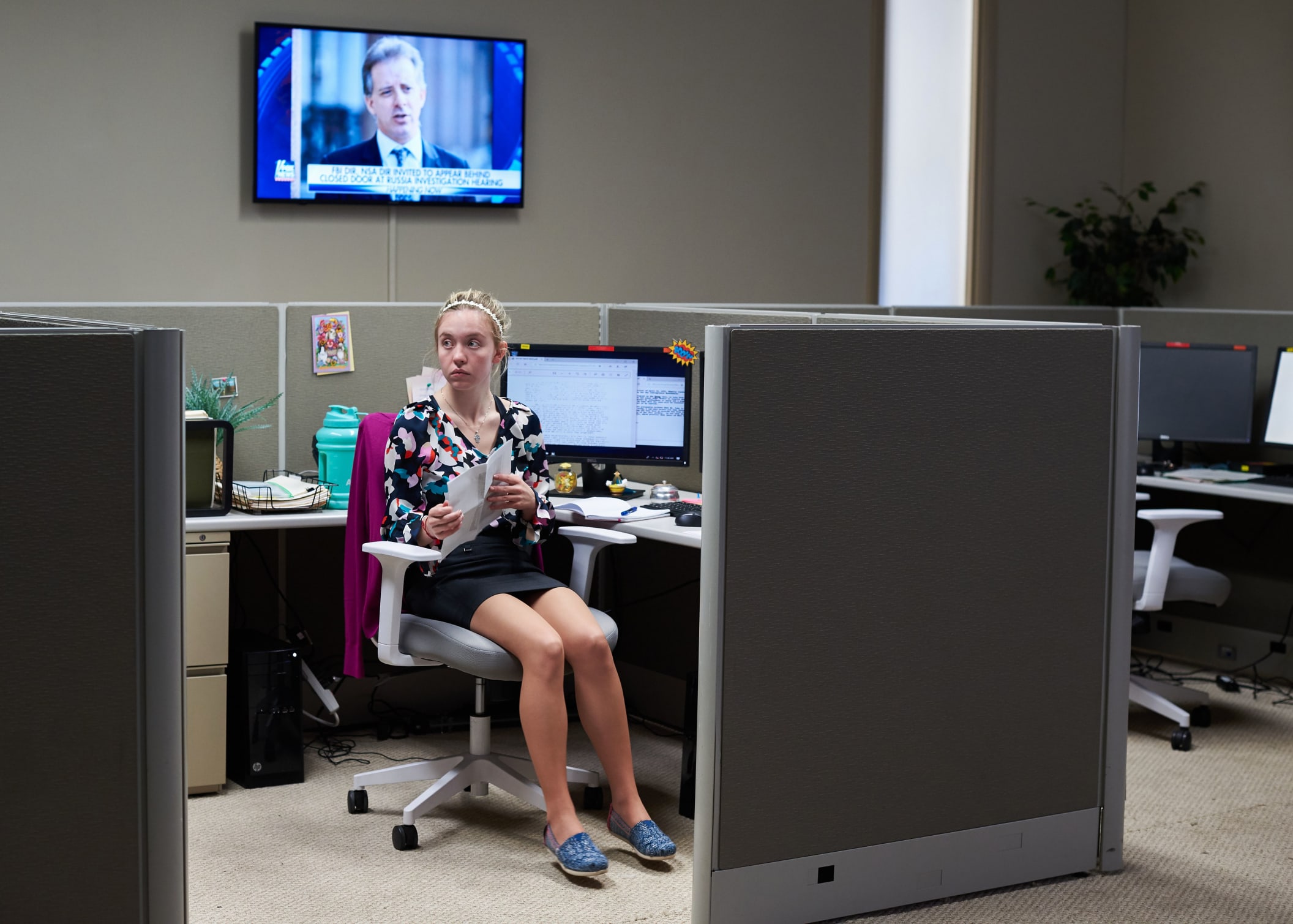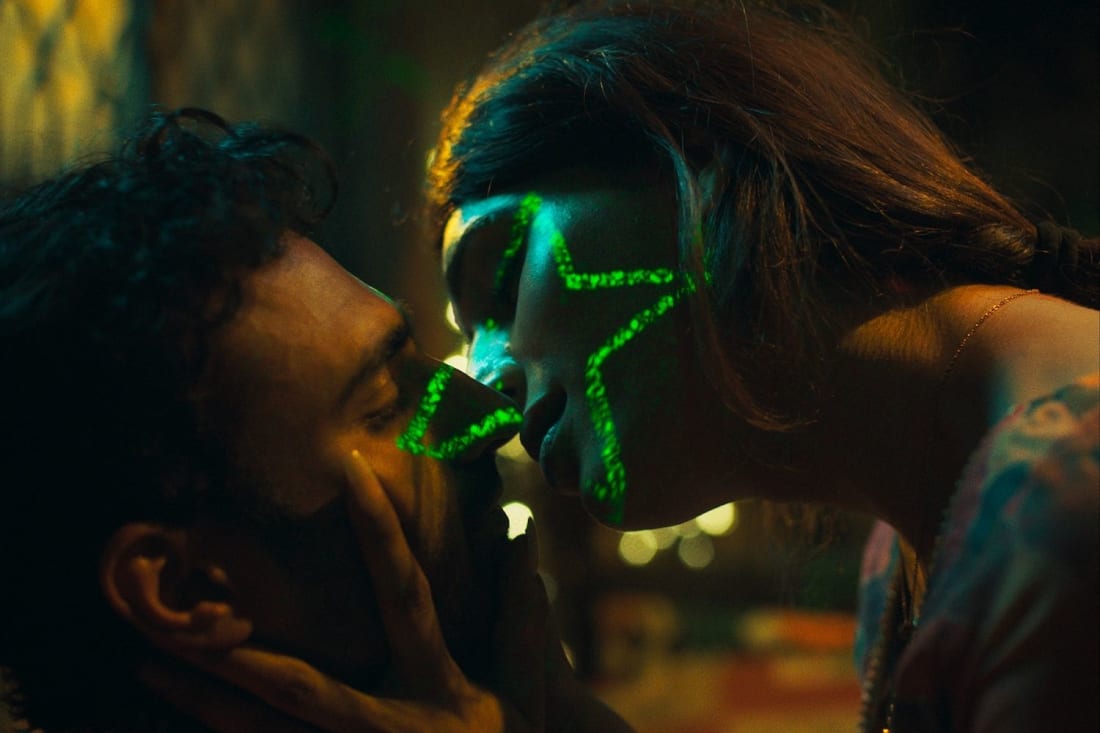Director Tina Satter on her Sydney Sweeney-starring whistleblower drama
The filmmaker discusses her taut, tense political thriller adapted from a real-life FBI interrogation
The filmmaker discusses her taut, tense political thriller adapted from a real-life FBI interrogation
Aa a patriot, a veteran and a millennial whistleblower, Reality Winner’s story is fascinating. The former National Security Agency (NSA) translator made headlines in the US in 2017 when, aged 25, she was found to have leaked a classified report. The report was about alleged Russian interference in the 2016 election that led to Donald Trump’s presidential appointment. As a result of leaking it, Winner was found guilty of violating the Espionage Act and was sentenced to five years and three months in prison - the longest prison term ever handed down by a federal court for unauthorised release of government information to the media.
But beyond the cold, hard details of her case, there are plenty of big questions posed by Winner’s actions. Are we always rewarded for doing the right thing? How far should we go for an ideal? Can morality always square with institutions? These topics and more are broached in the compelling, claustrophobic Reality.
Directed and written by Tina Satter and adapted from her hit play Is This a Room, the film sees Euphoria’s Sydney Sweeney undertaking the role of Winner. With the script drawing heavily from the transcript of the young whistleblower’s interrogation by the FBI, the dialogue has the urgency of a thriller, with Sweeney’s expert characterisation capturing the psychologically gruelling process in minute emotional detail.
Below, we speak to Satter about working with Sweeney, the moral grey area and complex female protagonists who can’t be put in a box.


What initially attracted you to the story? In the UK, at least, the Reality Winner case wasn't as big of a news item as I imagine it was in the US.
You know what? It was not a very big story here at all. I had only vaguely heard of her, she wasn’t an Edward Snowden or a Chelsea Manning. I had not paid attention to her. She was maybe in the New York Times, I'd seen her mug shot but I couldn't even have told you what she did - I thought it was somehow related to reality TV, I really did. Then six months later, I read this article about her and it had more pictures of her in other parts of her life. I was like, “Oh, she's really young.” And there was one of her in a Pikachu hoodie and there was something in her eyes. Then I learnt the details of her life - I didn't know she had served our country but now was a yoga teacher or that she had wanted to learn Arabic post 9/11. This was a fascinating young American at a very specific moment in America in 2017. I love a young female protagonist, especially one as complicated as her without an easy way to put her in a box. It felt really rich, her in real life and as a character.
What was the process of adapting Reality from your play Is This A Room? Were they made with different considerations in mind?
From the first time I read the FBI transcript, I was like, “This feels like a thriller, like a movie thriller and a play thriller.” Obviously, at that point, I made a lot of plays and had never made a feature length movie, but I thought this felt like a movie I could do. But I had a play commission right then and I was like, I can figure this out by working on this play. The play was really just about the dialogue, these actors step onto a platform and there was no set - it was just about watching their dynamics unfold verbally. With the movie, I wanted to see this young girl's house and how vulnerable it is when these men come into her house unexpectedly. I wanted to see her weird car. I wanted to see all those details.
I was always curious and had ideas and thoughts about what it would be like to move through that day as Reality. With film I knew we could actually play with what it felt like in her body and mind a bit more as she moved through that afternoon. Those were the reasons I was interested in making a screenplay and a movie. The play had been so specific, and the script of the play is essentially the transcript, though there's a very specific movement score to how the actors move around on stage. Once I sat down to work on the screenplay, I had a tonne of information, I had learned about the beats of the dialogue, but I was just so curious to show her world and to show her experience of that day.
And why did you choose to write the script in this verbatim style, based off of the interrogation transcript? I know this is more of a common style in theatre, but it’s quite rare in film.
The transcript just held everything. I just found the container really fascinating and sort of perfect. It has the beginning of an event, like the men get there and literally say "hi", and then they wrap it up saying “ending this recording”. Then, within it, what made me think “this could be a script” was all the unexpected diversions, both dark and humorous. It seems like a standard like, FBI interrogation, but then they start talking for a really long time about CrossFit. And also because it's an interrogation, they're asking Reality questions about herself so you get all this natural exposition, there's moments where you could see more of her life outside this one day. Like we are going to learn about this person as she talks about herself. You know she gets caught - that's not a spoiler, because we all know that - but how it happens becomes really fascinating when reading the transcript for the first time, like, when did they get her? She keeps dodging talking about this. It was like a ready-made thriller.
It’s interesting because the agents doing the interrogation seem like they’re playing a character.
They're all acting that day. That's something we talked a lot about because she's totally performing a version of herself. I've talked to FBI consultants and been like, “Is it like acting?” and they’ve been like, “It’s totally like acting when you go into that kind of situation.
And how was working with Sydney Sweeney? I feel like that was quite an inspired casting decision - we’re used to seeing her in contexts that are very different to this movie, where she’s presented as this bombshell, and she’s obviously changed her physique for this role. It allows for this real suspension of disbelief.
I mean, she’s just so talented. And there’s that transformation, as you note, that she does physically. She has very little makeup on and that's actually a big deal in a movie - we wanted it stripped back. But even how she holds her body is really different; she's just that good at craft, she's that good in front of the camera. There’s something else as well. Reality Winner is an unexpected whistleblower, she's an unexpected person to go through an FBI interrogation and then there was this aspect of that Sydney is unexpected to be that person. That felt really exciting and cool to lean into. I knew her acting could have those chops to move through that emotional landscape. So much of our conversation was asking about what that emotional trajectory is, because it's a longform conversation, almost a longform close-up. Like, “She's upset here - where does she have to go?” It was really great talking through that stuff and she’s so smart at that and at delivering you options within that in front of the camera.


How involved was Reality Winner herself with the film?
Myself, the production designer and the costume designer all were in touch with Reality. Essentially she was an informal consultant to the movie and answered very generously and openly if we had questions. Reality would talk to us about what the agents were wearing, or how many cars actually pulled up, things that were impossible to know from the transcript. In that way, she was this great resource. Sydney also wanted to meet with Reality and Reality was open to that, so those two had conversations just on their own, which I know were really meaningful to Sydney.
As a final question, what do you think the film has to say about what doing the right thing looks like?
It’s complicated. Reality does something that she feels is right and one could argue that whistleblowing is a necessary step for democracy to have checks and balances. But then there is the law breaking, because it's breaking the law of these institutions. So it's just really complicated. Reality is a human who's feeling like they're doing something right that they don't think is actually harming people. It was so fascinating understanding more about what Reality had done. To her, who'd actually served our country in the Air Force, it was a big deal to be that kind of patriot. I think in many ways, it felt like this was another extension of service according to her ideals. She's never denied what she did. And there's just so many sides to it and it’s really complicated. I find I don't have answers, which is why this material was so fascinating to me. There's so much I admire about her but then I also get this complicated thing, that she did break a rule and what do we do if people don't follow rules? Those questions sit inside me and I didn't make the film hoping to answer them. I definitely did not answer them for myself.
Reality is out in UK cinemas now.



